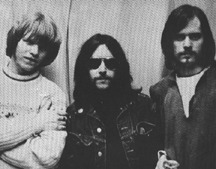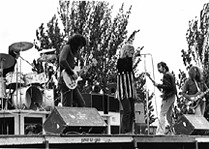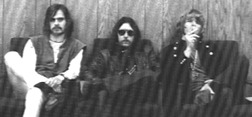FACTS
|
|
"White Lightning" was formed in Minneapolis, Minnesota in 1968 by ex-"Litter" guitarist "Zippy" Caplan and bassist Woody Woodrich. The two musicians had been jamming together for close to a year before they decided to become a group. |
 | |
|
|
The name "White Lightning" was picked by "Zip" Caplan and Woody Woodrich during their drive back from the "Litter's" filming of "Medium Cool" because it was another name for acid. |
|
|
"White Lightning's" original drummer, Garr Johnson, quit the group after only a months rehearsals because he didn't believe a three-piece act could make it in Minneapolis. Mick Stanhope was immediately brought in from Chicago by Ronn Roberts to fill the empty drummer's chair. |
|
|
"White Lightning" was the first power-trio in the Upper Mid-West. |
|
|
"White Lightning" was the first band in the five-state area to use all double stacked Marshall amplifiers. |
|
|
The song Of Paupers and Poets was written by Warren Kendrick. Originally a Pop-Bubble Gum style song, it was reworked into a heavier version and recorded before the band had stepped one foot on stage. |
|
|
"White Lightning" debuted the band, the record and The William Tell Overture, complete with drum solo, all on the same night at the Minneapolis venue "New City Opera House" (formerly "Mr. Lucky's") in the fall of 1968. |
|
|
Mistaking, at first, the single Of Paupers and Poets to be a new release by "Cream", the program manager at radio station KDWB agreed to play the record after learning the truth from Kendrick that it was a new group called "White Lightning". |
|
|
Of Paupers and Poets reached #5 on the Top 40 charts for the Twin Cities in January of 1969. |
|
|
Originally released on Warren Kendrick's Hexagon label, Of Paupers and Poets was later picked up by Atco ( an Atlantic subsidiary) for national release but failed due to lack of promotion. Both Hexagon and Atco 45rpm records are hard to get and command decent money on the collector's market. |
|
|
William, the flip side to Of Paupers and Poets was the first original song written by "White Lightning". |
 | |
|
|
The song William was named after the group's equipment manager, Bill "William J. Animal" Pluta. Originally a wild scream by Pluta was planned and recorded just in front of the guitar solo, but Kendrick stormed into the studio room insisting it be deleted. |
|
|
The backwards guitar effect Kendrick added at the end of William was deleted by Atco when they released the single. (All Hexagon copies of the record have the effect intact.) |
|
|
William is ranked #44 on the Top 100 listing of the "All Time Greatest Psychedelic" songs in the newly released book "I Wanna Take You Higher" published for the Rock and Roll Hall of Fame and Museum by Chronicle Books 1997. |
|
|
The song William has been covered over the years by "Broken Jug" on their album also titled William - Glitterhouse Records - vinyl LP - 1984 and by "Billy Synth and The Turnups" on their album Disorderly Conduct - Tragic Records - vinyl LP - 1983. Both records are out of print and considered hard to find. |
|
|
The original "White Lightning" version of William has appeared on the 1980's European Bootleg vinyl LP Acid Dreams (the group is listed as "White Light" on the label), the Bootlegged CD Acid Dreams Testament and the Bootlegged vinyl LP from France Everywhere Interferences most commonly know by it's re-title Chainsaw 2. These records are out of print and very rare. |
|
|
William has been covered live for years by an all female Garage band from Maine known as "The Brood". With numerous albums and 45rpm records on the market, the group has yet to record their version which is said to be, by people who have heard them live, the wildest of them all. |
|
|
Although the song Of Paupers and Poets made the Top 40 charts in the Twin Cities and was the A Side of the nationally released Atco 45rpm , it is the flip side William that "White Lightning" is best known for. |
|
|
Before having a full nights worth of original material, "White Lightning" covered obscure tunes by the "West Coast Pop Art Experimental Band" and "Quicksilver Messenger Service". |
|
|
Woody Woodrich shared the lead vocal duties with Mick Stanhope during the early days of the group. |
|
|
"White Lightning" was the first band in Minneapolis and the surrounding area to play all original material live and get away with it. |
|
|
The idea to do The William Tell Overture came to "Zip" Caplan and Woody Woodrich during their pre-band jam sessions. Pulling this section out of "Zip's" Boogie , Woody helped "Zippy" rework his full arrangement into the version that would become a trademark showstopper for both "White Lightning" and "Lightning". |
|
|
Two recorded versions of The William Tell Overture exist. The first, done by the 3-piece "White Lightning" in 1969 at the old Sound 80 studios, is now available for the first time on the CD White Lightning Strikes Twice - Arf Arf Records. The second version done in 1975 by the 5-piece "Lightning" has never been released. It features Mick Stanhope on Tippany for the finale and includes a horn section and keyboards. The engineer for this session was David Rivkin (later known as David Z. - Prince's engineer.) |
|
|
Charlie Carlson, a friend of Denny Waite, recorded the narration of The Lone Ranger origin heard at the beginning of the 3-piece "White Lightning" version of The William Tell Overture. Charlie went on to become a successful Disc Jockey. |
 | |
|
|
The William Tell Overture brought a standing ovation for both "White Lightning" and "Lightning" after every concert they played at some of the biggest Rock Festivals and venues in the United States. |
|
|
Mick Stanhope was one of the first drummers in the Upper Mid-West to effectively use double bass drums and they in fact became a trademark of both "White Lightning" and "Lightning". |
|
|
"White Lightning" was the first band in the Mid-West to feature an extended Bass guitar solo as part of it's stage show and Woody Woodrich was the first Bass player in the Mid-West to tackle such a feat. |
|
|
"Zippy" Caplan was the only guitar player in the 5 state area to play a Gibson "Flying V" guitar in the late '60's. |
|
|
Mark Gallagher, while with "The Litter", was a co-writer on the "White Lightning" song Bogged Down, penning some of the lyrics to Caplan and Woodrich's music. (This song can be heard for the first time on the CD White Lightning Strikes Twice.) |
|
|
Woody Woodrich was a co-writer on the "Litter" song (Under the Screaming Double) Eagle with Denny Waite and "Zip" Caplan. Later Woody sang the lead vocals both on stage and on the recorded "White Lightning" version. (This song can also be heard on the CD's White Lightning Strikes Twice and The Scotty Story - Arf Arf Records.) |
|
|
Both "White Lightning" and "The Litter" headquartered from a house in the Minneapolis lake area where they lived, rehearsed and partied. |
|
|
The Larry Loofbourrow song Confessions (Of a Traveler Through Time) from the K-Tel re-issue of $100 Fine, was also done live by "White Lightning". |
|
|
"White Lightning" recorded three Larry Loofbourrow songs, along with numerous other tracks, at Warren Kendrick's Lake Street Studio in Minneapolis in 1969. They were I'm Coming Down, Let Me Feel It Too (recorded earlier by Loofbourrow and "The Litter" at Goldstar in LA.) and Only Love (also originally recorded at Goldstar) with Woody Woodrich singing lead. |
|
|
Many titles of original "White Lightning" and "Lightning" songs had nothing to do with either the lyrics or the song's meaning. |
|
|
Both "White Lightning", as a 3-piece group, and "The Litter" were managed by Scott Doneen out of Chicago. "White Lightning" often appeared on a double bill with "The Litter". |
|
|
Because of threats directly related to their extremely long hair, and to avoid bodily harm when playing rural areas throughout the U.S., "White Lightning" had to have a police escort out of town after concerts on more than one occasion. |
|
|
A write-up in the Fargo, ND paper the "Forum" (April 1969) spoke very highly of "White Lightning" and the single Of Paupers and Poets. The staff writer described the group as "a high density wall of sound, tightly packed vibrations without mercy and without equal among other area groups." |
|
|
"Lightning" was the #1 draw in Chicago and Iowa from 1969 to 1970. |
|
|
Ronn Roberts, "Lightning" second guitarist, was originally a member of "The Litter" road crew. After working for the "White Lightning" road crew in addition to sitting in on a handful of tunes every gig, he became a permanent member when the group expanded to 5-pieces and became "Lightning". |
 | |
|
|
"Lightning" was the first band in the Upper Mid-West to effectively use double Lead guitars both on stage and in the recording studio. |
|
|
On a bill with "The Litter" and other groups, "Lightning" played before a massive gathering of over 35,000 people at the outdoor Grant Park Pavilion in Chicago in 1970. A Chicago television news crew captured The William Tell Overture on film and it ran on the 10 o'clock news. |
|
|
The new 5-piece "Lightning" recorded what they thought might be their first album, at the original Sound 80 Studios in Minneapolis, in 1969. Deciding to wait until the new Sound 80 facilities were completed and an offer from Pickwick and Ira Heilicher was firmed and signed, the self titled album "Lightning" was finally recorded in January of 1970. |
|
|
The album cover for "Lightning" was designed by local artist John Hanson from a concept by the band members. The original Starship Enterprise can be found on the back cover in the upper right hand corner. A copy of the album was sent to Gene Roddenberry shortly after it's release. |
|
|
The two small black ducks on the front cover of the "Lightning" album represented a losing poker hand (a pair of deuces) referred to as "a pair of ducks" by various members of the band during all night card games. |
|
|
The album "Lightning" was the record pick of the week in early 1970 on radio station WABC in Los Angeles. |
|
|
Tom Jung, the Sound 80 engineer who recorded the "Lightning" album for Pickwick, went on to become involved in the film industry. In recent years his name can be found among the credits at the end of many big budget Hollywood movies. |
|
|
While recording the "Lightning" album a surprise visitor hung around the studio listening to playback takes with the group. After complimenting them on their music John Denver left the studio. |
|
|
Woody Woodrich was the first bass player to use red-line compression for recording before compressors were available to the consumer market. He originally accomplished this while recording with the group in Chicago for then manager Doug Martin. Transferring the information to Sound 80, and with Tom Jung's help, the effect was used recording the "Lightning" album. The process was kept so hush-hush that when a member of another Minneapolis band, who'd made it nationally, inquired about it, he was refused the information. |
|
|
To achieve maximum isolation, the song Madame Sunrise was recorded in two separate studio rooms simultaneously with band members communicating via headphones and microphones. |
|
|
The Xylophone opening to When A Man Could Be Free on the P.I.P. album "Lightning" was played by Bernie Pershey. The melody was taught to him by Mitch Tribula, a.k.a. Max Schimone, who would often whistle the tune during all night card games. Tribula, originally from Europe, said it was taught to him in the old country. |
|
|
The song They've Got The Time from the album "Lightning" was written the night Jimi Hendrix died. It is a tribute not only to Hendrix but to Brian Jones of "The Rolling Stones" and Janis Joplin as well. |
|
|
They've Got The Time was the only song on the "Lightning" album to be recorded with both vocal and basic tracks on the same take. Only the guitar solo was overdubbed. |
|
|
The cover song (Ghost) Riders in the Sky was chosen to close the "Lightning" album, first because it was a favorite of Mick Stanhope's father and second because the group decided the obvious choice for an ending, The William Tell Overture, should remain exclusive to live performances. |
|
|
Rigged up by Sound 80's Herb Pilhofer, Mick Stanhope sang through a Moog Synthesizer for the opening chorus of (Ghost) Riders in the Sky. |
|
|
Pickwick International guaranteed the band an initial run of 10,000 copies of the album "Lightning". It is estimated that a total of 20-25,000 copies were eventually sold including all known pressings. |
|
|
All recordings from the group's inception in 1968 to their demise in 1971 were performed by either the Stanhope, Caplan, Woodrich trio or the 5-piece "Lightning" which also included Ronn Roberts and Bernie Pershey. |
|
|
The album "Lightning" on Pickwick was originally slated to have an insert with song lyrics and a band photo. The inserts were eliminated from the album release because Pickwick didn't have them ready in time for distribution. |
|
|
Every released version of the album "Lightning" has listed the song writers credits incorrectly. Pickwick promised to fix the problem, but never did. |
|
|
The "Lightning" album was pressed using a new German mastering process, but the grooves were cut too hot and the record wouldn't track properly on consumers turntables. |
|
|
The album "Lightning" was one of the first releases of the early '70's to come out in cassette format. |
|
|
Although "Lightning" received a good review in Billboard magazine, none of their records ever made the Billboard charts. |
 | |
|
|
The Guthrie Theatre would often request the use of "Lightning" equipment for big name acts like "Led Zeppelin" and "B. B. King". |
|
|
Although the album "Lightning" got national airplay in addition to advertisements in Rolling Stone and Billboard, it was unsuccessful due to mishandling by Pickwick International of both product and promotion. The group in turn demanded a termination of contract and got it. |
|
|
"Lightning" was one of the first Minneapolis bands to play major Rock Festivals such as the Stevens Point Festival where, just as the sun was rising, 80,000 hungry people awoke to the band's energy and drive. At the Galena Illinois Festival they received not only standing ovations and encores but were also asked to play again the next day. They also played the Wadena Iowa Festival where they were billed above such new comers as "REO Speedwagon". |
|
|
"Lightning's" last manager, Pat Rains, went on to handle Al Jarreau and David Sanborn. |
|
|
Opening for "Grand Funk Railroad" New Years Eve 1970-71 to a sold out house of more than 12,000 people in Des Moines, Iowa, the crowd rushed the stage upon hearing the first few bars of The William Tell Overture. "Grand Funk" later told the promoters they would never play on the same bill with "Lightning" again. |
|
|
"Lightning" has toured all over the United States playing such venues as The Electric Theatre - Chicago, Aragon Ballroom, Veterans Memorial Auditorium, Minneapolis Auditorium, Parade Stadium, University of Pennsylvania, Grant Park Pavilion, University of Missouri at Columbia and the Chattanooga Auditorium among others. The band has been billed with such famous acts as "Jethro Tull", "James Gang", "Eric Burdon and War", "Sly and the Family Stone", "Johnny Winter", "Steppenwolf", "3 Dog Night", "Spirit", "The Byrds", "Creedence Clearwater Revival", "Alice Cooper" and "Joe Cocker" to mention just a few. |
|
|
Both "White Lightning" and "Lightning" have been written up in books and magazines over the years. Cream magazine called them a "High Energy Group", Billboard magazine referred to them as "a superb Rock group of the highest caliber, distant from the current craze of ego trips, the group is successful in playing together with some very tasty double leads". The song William is listed among the top 100 Psychedelic songs in the book "I Wanna Take You Higher" and the groups name and listings of their recordings can be found in numerous price guides and music listings including Joel Whitburn's Top Pop Albums 1955-1996 and Tom Tourville's Minnesota Rocked (all 4 editions). |
|
|
There have been 5 different versions of "White Lightning" from 1968-1974 |
|
|
There have been 6 different versions of "Lightning" from 1969-1990. |
|
|
No one member has played in all 11 versions of both groups combined. |